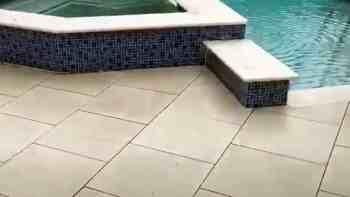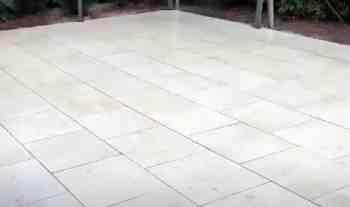When it comes to paving solutions, there’s a myriad of options available in the market, but Shell Stone Pavers have been garnering attention for their unique blend of aesthetics and durability.
In this comprehensive review, we’ll delve deep into the world of Shell Stone Pavers, exploring the pros and cons, while answering some frequently asked questions. So, let’s dive in!
The Many Pros of Shell Stone Pavers
- Aesthetic Appeal: Nature’s Artwork on Display

One of the most striking aspects of Shell Stone Pavers is their breathtaking appearance. These pavers are made from natural shell stone, which means each piece is unique and has its own story to tell.
The stone is a sedimentary rock, filled with fossilized shells and coral fragments, creating an exquisite visual treat. The combination of various hues, textures, and patterns will surely make your outdoor space stand out from the rest.
- Durability: Built to Last
When investing in a paving solution, durability is always a top priority. Shell Stone Pavers are not only visually appealing but also stand the test of time. They are highly resistant to wear and tear, and can easily withstand high foot traffic, making them an ideal choice for patios, pool decks, and walkways.
- Versatility: Endless Possibilities
The beauty of Shell Stone Pavers lies in their versatility. These pavers come in a wide range of shapes, sizes, and colors, allowing you to create unique designs and patterns for your outdoor space.
Whether you’re looking for a classic, rustic, or contemporary look, Shell Stone Pavers offer endless possibilities to create a space that truly reflects your style and personality.
- Low Maintenance: Easy on the Wallet and Time

Another significant advantage of Shell Stone Pavers is their low maintenance requirements. Unlike other paving materials, these pavers don’t require frequent sealing or polishing to maintain their appearance.
A simple cleaning routine involving sweeping and occasional pressure washing is enough to keep them looking as good as new.
The Few Cons of Shell Stone Pavers
- Cost: A Slightly Hefty Investment
One of the few drawbacks of Shell Stone Pavers is their cost. Due to the unique and natural composition of the stone, these pavers can be more expensive than other paving materials.
However, considering their durability and low maintenance requirements, the long-term benefits might outweigh the initial investment.
- Installation: Professional Help Required
Installing Shell Stone Pavers can be a bit more challenging than other types of pavers. Due to their natural composition, each piece may have slightly different thicknesses and shapes, which can make the installation process a bit tricky.
It’s recommended to hire a professional to ensure proper installation and prevent any potential issues down the line.
FAQ: Common Questions About Shell Stone Pavers
Shell Stone Pavers have a naturally slip-resistant surface, making them a popular choice for pool decks and other wet areas.
However, like any other stone, it can become slippery if not properly maintained. Regular cleaning and sealing can help maintain the slip-resistant properties of Shell Stone Pavers.
Shellstone pavers are a type of natural stone paver made from sedimentary rock, composed of fossilized shells and coral fragments. They are known for their unique appearance, durability, and versatility, making them a popular choice for outdoor paving projects.
Shellock pavers are a type of shell stone paver, specifically made from a combination of crushed shells and concrete. The unique composition gives these pavers an attractive look similar to shell stone, while also providing additional durability and strength.
Yes, shell stone is a natural stone. It is a sedimentary rock formed over millions of years from the accumulation of fossilized shells and coral fragments. The beautiful patterns, colors, and textures in shell stone are a result of this natural process, making each piece unique and one-of-a-kind.
Shell stone is a sedimentary rock primarily composed of fossilized shells, coral fragments, and other calcareous materials. The stone often contains a mixture of minerals, such as calcite and aragonite, which contribute to its unique appearance and texture.
Cleaning shell stone pavers is relatively simple and can be done with minimal effort. Here are some steps to follow:
1. Sweep the surface: Regularly sweep your shell stone pavers to remove dirt, debris, and leaves. his helps prevent the buildup of grime and stains.
2. Wash with water: Occasionally, use a garden hose or pressure washer to wash the surface of your pavers. Make sure to use a gentle setting to avoid damaging the stone.
3. Use a mild cleaning solution: For tougher stains, mix a mild detergent with water and gently scrub the affected area with a soft brush. Avoid using harsh chemicals or acidic cleaners, as they can damage the stone’s surface.
4. Rinse thoroughly: After cleaning, rinse the pavers thoroughly with water to remove any residual soap or detergent.
5. Seal the pavers: To maintain the appearance and durability of your shell stone pavers, consider sealing them every few years. Sealing helps protect the stone from stains, fading, and other potential damage.
Conclusion: A Worthwhile Investment for a Timeless Outdoor Space
In conclusion, Shell Stone Pavers offer an unbeatable combination of aesthetics, durability, and versatility, making them a fantastic choice for any outdoor space. While the initial investment may be higher than other paving materials, the long-term benefits and low maintenance requirements make them a worthwhile option.
By understanding the pros and cons of Shell Stone Pavers and addressing common concerns through the FAQ section, we hope this comprehensive review has provided you with the necessary information to make an informed decision for your next outdoor project. Happy paving!



